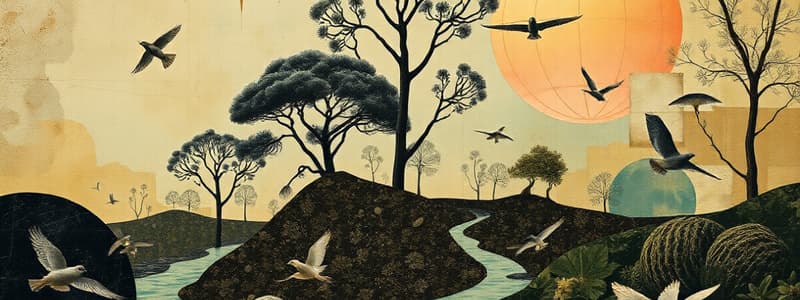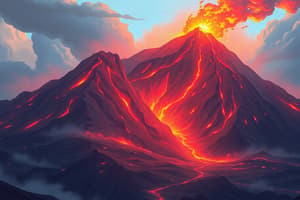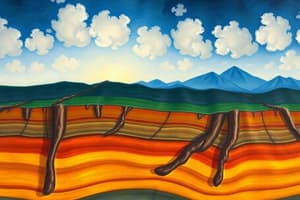Podcast
Questions and Answers
Čo predstavuje príroda na Zemi?
Čo predstavuje príroda na Zemi?
- Jedinečné stvorenia vytvorené človekom
- Zloženie všetkých biologických organizmov na svete
- Súhrn javov a predmetov, ktoré nevytvoril človek (correct)
- Výsledok urbanizácie a priemyselného rozvoja
Aký je proces, ktorým vznikajú prírodné javy na Zemi?
Aký je proces, ktorým vznikajú prírodné javy na Zemi?
- Zemská evolúcia a prírodné procesy (correct)
- Kultúrne zmeny a vývoj civilizácie
- Tvorba technológie a strojov
- Oprava poškodených oblastí človekom
Ktoré z nasledujúcich tvrdení najlepšie vystihuje hlavnú charakteristiku prírody?
Ktoré z nasledujúcich tvrdení najlepšie vystihuje hlavnú charakteristiku prírody?
- Príroda obsahuje iba biologické organizmy.
- Príroda sa neustále vyvíja a mení v čase. (correct)
- Príroda je stabilná a nemení sa.
- Príroda je umelý koncept vytvorený človekom.
Ktorá z nasledujúcich definícií najpresnejšie charakterizuje, čo je príroda?
Ktorá z nasledujúcich definícií najpresnejšie charakterizuje, čo je príroda?
Ako by ste opísali vznik prírody na našej planéte?
Ako by ste opísali vznik prírody na našej planéte?
Flashcards
Príroda
Príroda
Súhrn javov a predmetov na Zemi, nevytvorených človekom.
Javy v prírode
Javy v prírode
Prírodné procesy a úkazy, ktoré sa odohrávajú na Zemi.
Predmety v prírode
Predmety v prírode
Objekty, ktoré existujú prirodzene a nie sú umelé.
Vývoj Zeme
Vývoj Zeme
Signup and view all the flashcards
Nevytvorené človekom
Nevytvorené človekom
Signup and view all the flashcards
Study Notes
Definition of Nature
- Nature encompasses all phenomena and objects found on Earth, originating and evolving during Earth's development, and not created by humans.
- It includes living organisms (plants, animals, microorganisms) and non-living components (minerals, rocks, water, air).
- Natural processes, such as weather patterns, geological events, and biological cycles, shape and maintain the environment.
Key Components of Nature
- Living organisms: Plants, animals, fungi, and microorganisms. These interact with each other and the non-living components of their environment.
- Non-living components: Minerals, rocks, water, air, and the various chemical and physical processes that affect them (e.g., erosion, weathering, climate).
Natural Processes
- Biological cycles: These cycles (e.g., the carbon cycle, the water cycle) involve the continuous flow of materials and energy within the ecosystem.
- Geological processes: These include mountain formation, erosion, and the movement of tectonic plates, which shape the Earth's surface.
- Weather patterns: Determined by atmospheric conditions, including temperature, precipitation, and wind.
- Ecosystem interactions: The complex relationships between living organisms and their environment, including food webs, energy flow, and nutrient cycling.
Distinction from Human-Made
- Nature is distinct from human creations, such as buildings, roads, and manufactured products.
- The concept distinguishes natural events and processes from man-made ones.
Studying That Suits You
Use AI to generate personalized quizzes and flashcards to suit your learning preferences.




